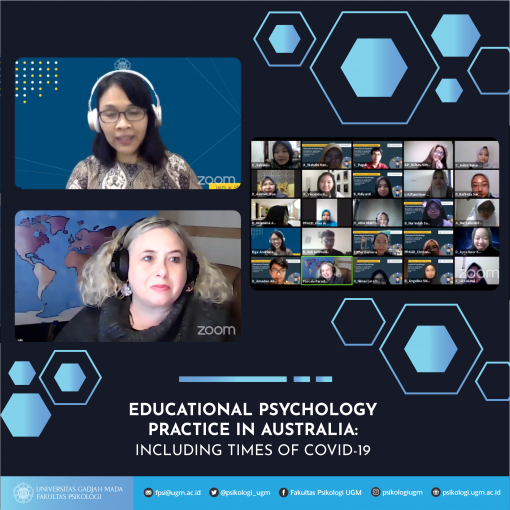
The Faculty of Psychology UGM on Friday (11/6) held a guest lecture with the topic “Educational Psychology Practice in Australia Including Times of COVID-19”. This event was accompanied by resource persons who are educational ethics experts in private schools and lecturers as well as supervisors at the Cronichal Clinic Monarch University, Dr. Pascale Paradis BA. MEd, DEdPsy, MAPS, MBPsS, FCEDP.
Starting at 14.00, this event was opened for the first time by Elga Andriana, S.Psi., M.Ed., Ph.D who gave a welcome speech and greeting to the participants. Elga also thanked those who had helped organize the event. Then the event continued with the delivery of material by the speakers.
The presentation of the material began with Pascale who said that there were three leading themes that would be presented related to the practice of educational psychology in Australian schools. First, the theme relates to the form of practice in Australian schools. There are several forms of practice, including practices based on collaboration between schools and the government, collaboration with private schools, and others. Then, the forms of practice are further divided based on needs and funding, socio-economic areas, and strategic areas.
Furthermore, the role of educational psychology practice is divided into three levels. First level to deal with everyone. The second tier is for children who are at low risk. Finally, the third level is dealing with children who are at high risk by minimizing their impact.
In more detail, Pascale makes a few points about what psychologists do in Australian schools. Pascale says psychologists must understand the funding system as it relates to the delivery of treatment. Several cases have occurred, when a school is found with excess funds, the school can become a driving force for the surrounding environment. Excess funds can be channeled to those in need through community projects, so parents who need funds for treatment can still get funding from other schools. However, there are terms and conditions that apply.
Then, the psychologist is in charge of recording needs, supporting behavior development plans, taking measurements, providing recommendations. They even communicate with non-psychologists or the general public who need information regarding the treatment process.
